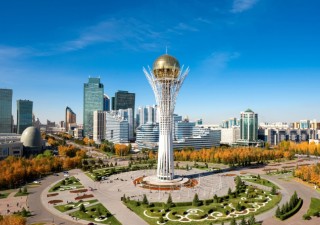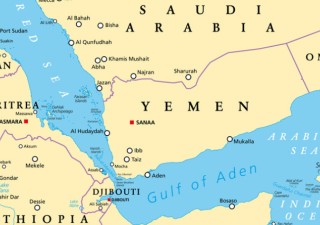Qatar revolutionizes its IP landscape
31 March 2025

Qatar’s National Vision 2030 has modernized its IP landscape, positioning Qatar to become a hub for innovation and economic diversification. Excel V. Dyquiangco explains.
Qatar recently undertook a major overhaul of its intellectual property landscape, aligning with its Qatar National Vision 2030 to position itself as a hub for innovation and economic diversification. One of the key developments was the establishment of a dedicated grievance committee within the Ministry of Commerce and Industry (MoCI). This committee provides a structured process for appealing patent applications, enhancing trust and transparency among inventors and businesses.
Qatar also introduced revised power of attorney requirements to strengthen the integrity and efficiency of legal documentation. The new regulations mandate that foreign POAs undergo legalization by the Qatar Ministry of Foreign Affairs and include certified Arabic translations. Furthermore, the most significant advancement is Qatar’s accession to the Madrid Protocol, streamlining international trademark protection for both domestic and foreign businesses.
In addition, Qatar has substantially reduced intellectual property service fees – by as much as 90 percent in some cases – making IP protection more accessible, particularly for SMEs and individual inventors.
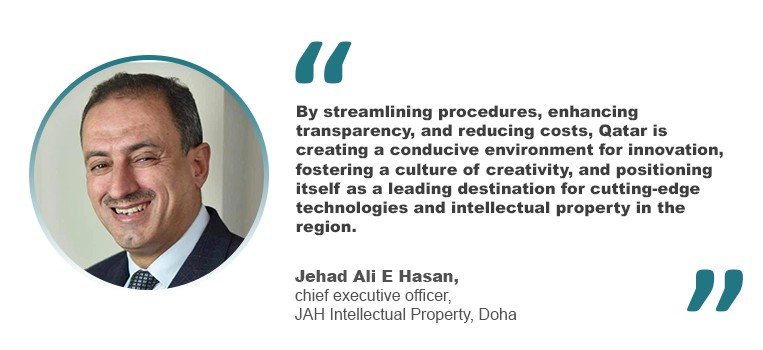
With these changes ensuring greater legal clarity and compliance for businesses operating in the country, Qatar aims to foster a more innovative and business-friendly environment.
“These legislative and regulatory updates are meticulously aligned with Qatar’s broader economic goals,” said Jehad Ali E Hasan, chief executive officer at JAH Intellectual Property in Doha. “By streamlining procedures, enhancing transparency, and reducing costs, Qatar is creating a conducive environment for innovation, fostering a culture of creativity, and positioning itself as a leading destination for cutting-edge technologies and intellectual property in the region.”
He added: “These initiatives collectively contribute to a more efficient, transparent, and accessible IP registration process, enhancing a business-friendly environment and attracting both local and foreign investments in innovation.”
Strengthening IP enforcement
With the strengthening of IP enforcement mechanisms through these initiatives, the enhancements to the IP framework suggest a commitment to providing effective legal recourse. For instance, the establishment of clear and efficient processes within the MoCI, alongside the alignment with international standards through the Madrid Protocol, implies that rights holders will have access to improved mechanisms for addressing infringement.
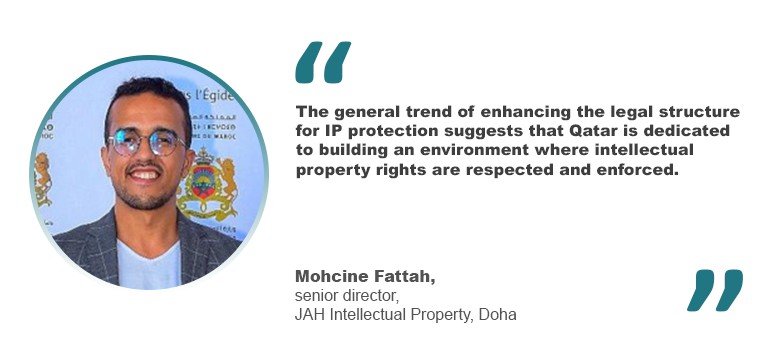
“The general trend of enhancing the legal structure for IP protection suggests that Qatar is dedicated to building an environment where intellectual property rights are respected and enforced,” said Mohcine Fattah, a senior director at the same firm. “Meanwhile, when dealing with trademark infringement in Qatar, rights holders have access to various channels. But our firm follows a structured framework that offers various avenues for recourse. Initially, it is highly recommended to conduct a thorough trademark search with the Qatari Trademark Office. This crucial step helps to determine whether the infringing party has any existing registrations or pending applications for the trademark in question, providing a clear picture of the situation.”
He said that following the search, the appropriate action depends on the findings. “If the infringing party has not registered the trademark, a strong cease and desist letter can be issued,” he said. “This formal warning serves to notify the infringer of their unlawful activities and demand that they cease immediately. Conversely, if the infringing party has secured a trademark registration, initiating a cancellation action based on bad faith becomes a viable option. This legal process aims to challenge and overturn the infringing registration.”
In addition to these measures, administrative action can be pursued by filing a complaint with the Ministry of Commerce and Industry. This ministry plays a pivotal role in enforcing trademark rights. The process involves an investigation, potential hearings, and, if warranted, referral to the Criminal Investigation Department (CID) and the Public Prosecution Office (PPO).
“This can lead to criminal proceedings with potential penalties. Furthermore, direct criminal action can also be pursued by filing directly to the Public Prosecution. Finally, alongside or instead of criminal action, Civil actions can be undertaken to gain compensation for losses and to stop the infringement,” said Fattah.
Digital transformation and trademarks
With regards to artificial intelligence, Qatar is addressing IP protection for AI-generated content and emerging technologies by strategically leveraging and adapting its existing intellectual property framework while keeping a keen eye on global trends.
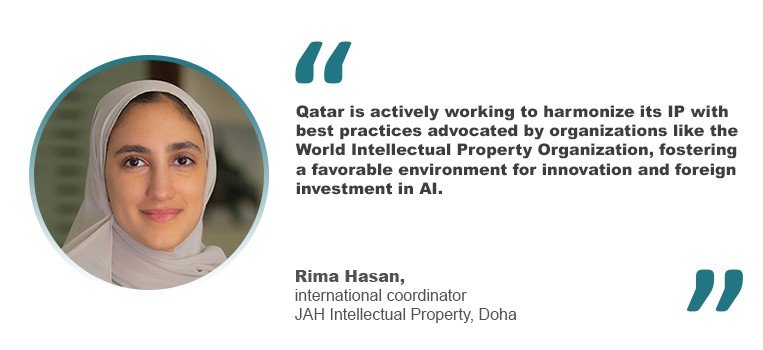
“The nation’s established copyright and IP laws, such as Law No. 7 of 2002, serve as a foundational base, with ongoing efforts to clarify their application to AI-generated works, particularly concerning authorship and ownership,” said Rima Hasan, an international coordinator at the same firm. “Recognizing the importance of international alignment, Qatar is actively working to harmonize its IP with best practices advocated by organizations like the World Intellectual Property Organization, fostering a favourable environment for innovation and foreign investment in AI.”
She added that the Ministry of Commerce and Industry plays a vital role in enforcing IP rights, with continuous improvements to enforcement mechanisms aimed at effectively combating digital IP violations.
“Qatar is also acutely aware of the evolving global discourse on the copyrightability of AI-generated content and is closely monitoring these developments, understanding that its legal framework must adapt to the rapidly advancing technological landscape, ensuring a balanced IP environment that encourages AI innovation while protecting the rights of creators and innovators,” she said.
In terms of trademarks, Qatar’s intellectual property landscape is undergoing significant evolution, particularly concerning trademarks, as evidenced by the nation’s recent adoption of the Gulf Cooperation Council Trademark Law, which aims to harmonize regional IP practices within the GCC state members.
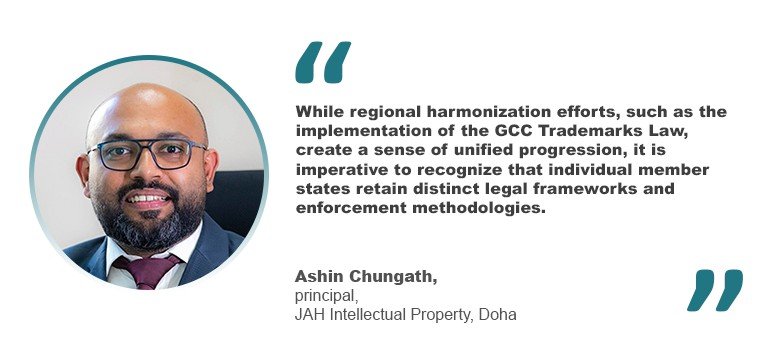
According to Ashin Chungath, a principal at the same firm, although this law promotes uniformity in prosecution and enforcement, it is crucial to understand that it does not establish a singular, unified registration system; instead, each GCC member state, including Qatar, retains its individual trademark office and national registration procedures, meaning multinational corporations must still navigate separate national filings.
He said: “Meanwhile, navigating the evolving IP landscape in the GCC demands a multifaceted approach from multinational companies. While regional harmonization efforts, such as the implementation of the GCC Trademarks Law, create a sense of unified progression, it is imperative to recognize that individual member states retain distinct legal frameworks and enforcement methodologies.”
“Therefore, a thorough understanding of each country’s specific regulations is paramount. Proactive registration of all intellectual property, including patents, trademarks, and copyrights, is crucial, as protection in one GCC nation does not automatically extend to others. Even with the GCC Trademarks Law, national registration remains a necessity,” he added.



